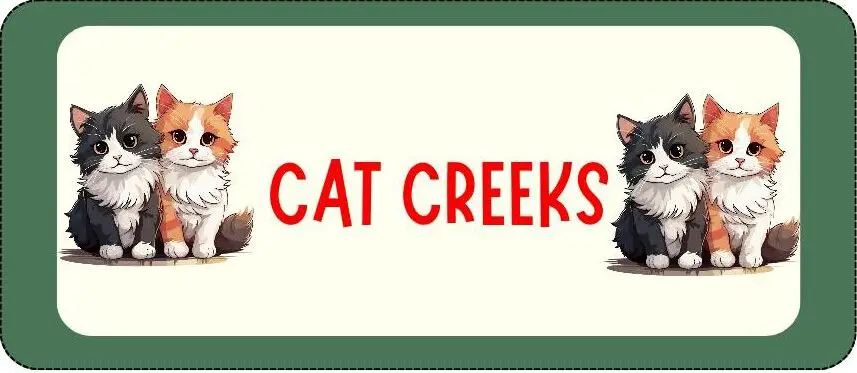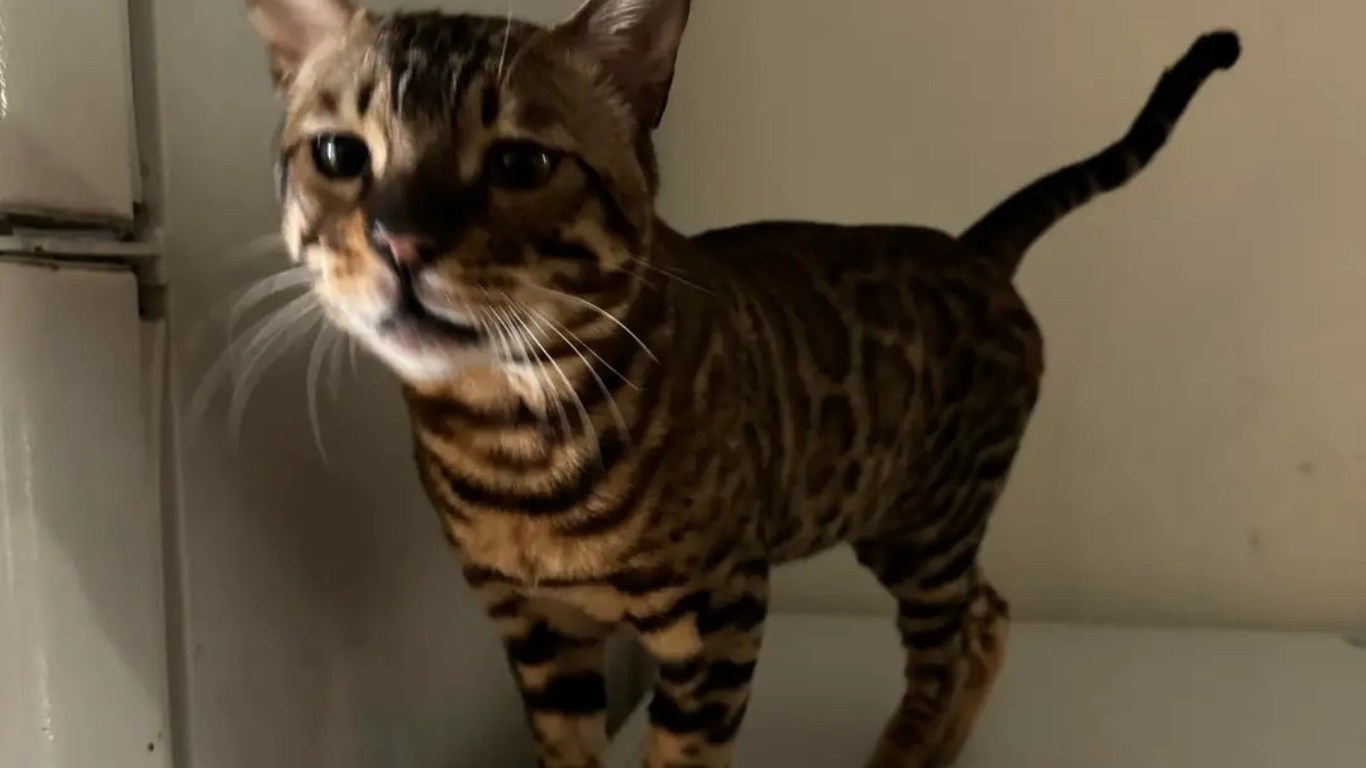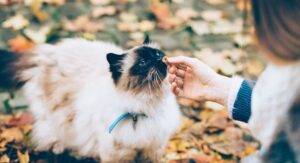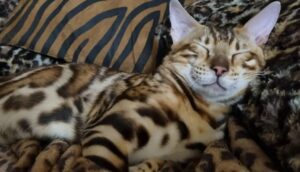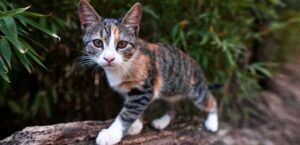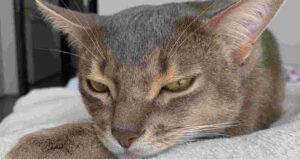Are you worried about your Bengal cat’s weight? Is your feline friend looking leaner than usual? Don’t fret!
In this blog post, we’ll delve into the reasons behind your Bengal cat’s skinny physique and provide helpful tips to ensure their health and happiness.
So, let’s unravel the mystery together and give your beloved kitty the care they deserve!
Recognizing a Skinny Bengal Cat
To recognize a skinny Bengal cat, keep an eye out for visible ribs, a prominent spine, and a lack of muscle mass.
Additionally, you may notice a decrease in energy levels, a dull coat, and a reluctance to eat, their waistline may be more pronounced, giving them a slender appearance.
Why Is My Bengal cat so skinny
Your Bengal cat appears skinny due to their high rate of metabolism, leading to faster burning of calories, and inadequate nutrition or health issues like parasites could contribute to their weight loss.
Bengal cats can also appear skinny due to their genetic makeup, which includes a wild component that differs from regular domestic cats.
Additionally, Bengal cats are highly active and burn more calories than they consume, which can contribute to their lean appearance.
However, it’s important to ensure that your Bengal cat is not too thin to the point where you can see their ribs, and to monitor their nutrition, exercise, and overall health
It is important to ensure that you are feeding your Bengal cat the right amount of high-quality, nutritious food and monitoring their overall health.
Let’s dig deeper…
Potential Reasons Your Bengal Cat Is Skinny
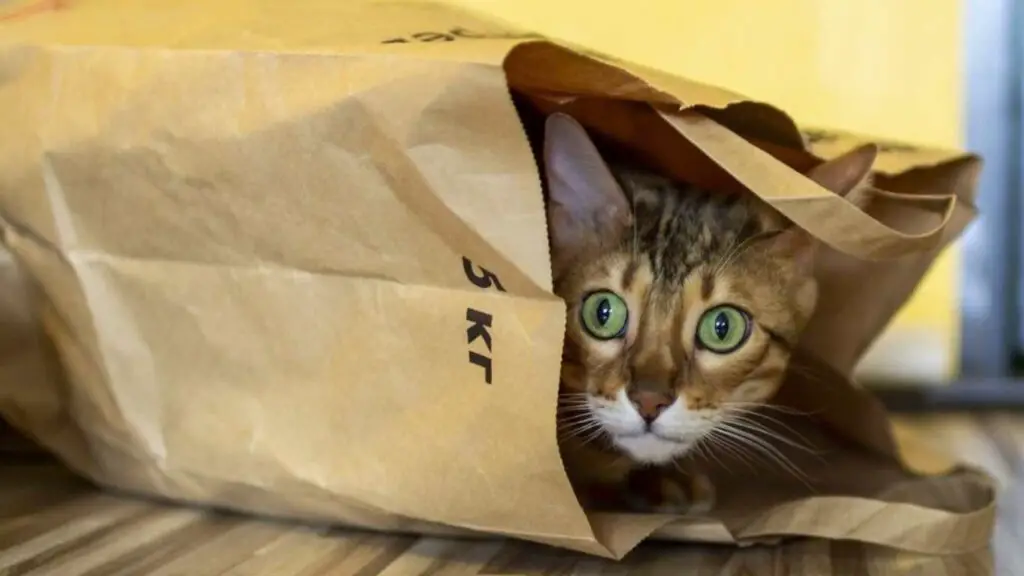
To understand why your Bengal cat is skinny we must look at some of the potential causes which are as follows:
Parasitic Infestation
Parasitic infestations can cause weight loss and other health issues in cats.
Bengal cats, like any other breed, can be affected by gastrointestinal parasites or intestinal parasites.
These parasites can interfere with the cat’s ability to absorb nutrients from their food, leading to weight loss and other symptoms.
If you suspect that your Bengal cat has a parasitic infestation, it is important to consult with a veterinarian for proper diagnosis and treatment.
The veterinarian may recommend deworming medications or other appropriate treatments to address the infestation and help your cat regain weight.
Thyroid Problems
Thyroid problems, such as hyperthyroidism or hypothyroidism, can also contribute to weight loss in Bengal cats.
Hyperthyroidism is a condition in which the thyroid gland produces excessive amounts of hormones, leading to an increased metabolic rate and weight loss.
On the other hand, hypothyroidism is characterized by an underactive thyroid gland, which can result in a decreased metabolic rate and weight loss as well.
If you suspect that your Bengal cat may have a thyroid problem, it is important to consult with a veterinarian for proper diagnosis and treatment.
The veterinarian may recommend blood tests and other diagnostic procedures to assess the thyroid function and prescribe appropriate medications or treatments to manage the condition.
Dietary Issues
Dietary issues can also contribute to a Bengal cat being skinny.
It is important to ensure that your cat receives a balanced and nutritious diet that meets their needs. Bengal cats, like all cats, require a diet that is rich in protein and fat.
High-quality commercial cat food that is specifically formulated for Bengal cats can provide the necessary nutrients.
It is important to follow the feeding guidelines provided by the manufacturer and consult with a veterinarian if you have any concerns about your cat’s diet.
Additionally, if you are feeding your cat a homemade or raw food diet, it is crucial to ensure that it is properly balanced and meets all of your cat’s nutritional requirements.
Consulting with a veterinarian or a veterinary nutritionist can be helpful in formulating a suitable diet for your Bengal cat.
Genetics
Genetics can play a role in determining a cat’s size and weight.
The genetic makeup of a Bengal cat can vary, and some cats may naturally be smaller or thinner due to their ancestry.
For example, if a Bengal cat has more Abyssinian or Bengal in its bloodline, it may tend to be smaller in size.
In this case, it’s important to understand that the cat’s size may be within the normal range for its genetic background, and there may not be a need for concern.
Gastrointestinal Issues
Gastrointestinal issues can also contribute to a Bengal cat being skinny.
These issues can include conditions such as malabsorption, inflammatory bowel disease, or parasites.
If your cat is experiencing gastrointestinal problems, it may have difficulty absorbing nutrients from its food, leading to weight loss.
If you suspect that your cat has gastrointestinal issues, it’s important to consult with a veterinarian.
They can perform a thorough examination and recommend appropriate diagnostic tests to identify the underlying cause.
Treatment options may include dietary changes, medication, or other interventions based on the specific diagnosis.
Underfeeding or Neglect
Underfeeding or neglect can be another potential reason for a Bengal cat being skinny.
If a cat is not receiving enough food or is being neglected, it can lead to weight loss and potential health issues.
It’s important to ensure that your cat is receiving a well-balanced diet suitable for its individual needs.
Consult with your veterinarian or a qualified cat care specialist to determine the appropriate amount and type of food for your cat.
Feeding instructions on cat food packaging can also provide guidance on portion sizes.
Regular feeding, preferably splitting the daily meals into multiple smaller portions, can help ensure that your cat is getting enough nutrition.
Feeding Competition
If you have multiple pets in your household, especially other cats, feeding competition could be a possible reason why your Bengal cat is skinny.
Some cats are more assertive and dominant when it comes to mealtime, which may lead to the Bengal cat not getting enough food.
To address this issue, consider separating your Bengal cat during feeding times.
Create a quiet and calm feeding space where your cat can eat without feeling threatened or rushed.
Providing multiple feeding stations or using timed feeders can also help ensure that your Bengal cat has access to food throughout the day.
Monitoring their food intake and adjusting portion sizes accordingly can also be beneficial.
Underlying Health Conditions
Another reason why your Bengal cat may be skinny could be an underlying health condition.
Some medical issues, such as dental problems, kidney issues, liver issues, thyroid problems, gastrointestinal disorders, or parasites, can affect a cat’s weight and appetite.
It’s important to consult with a veterinarian if you suspect that your Bengal cat’s weight loss is due to a health condition.
The vet can perform a thorough examination, run diagnostic tests, and recommend appropriate treatment options.
Following the veterinarian’s advice and administering any prescribed medication or dietary changes can help address the underlying health issue and ultimately improve your cat’s weight.
Stress or Anxiety
Cats, including Bengal cats, can be sensitive to changes in their environment or routine.
Stress or anxiety can lead to a decrease in appetite and weight loss.
Common stressors may include the addition of a new pet, moving to a new home, or changes in the household dynamics.
To address stress or anxiety, create a calm and secure environment for your Bengal cat.
Provide hiding spots, comfortable bedding, and vertical spaces for them to retreat to when they feel overwhelmed.
Engage in interactive playtime and provide mental stimulation to help alleviate anxiety.
If necessary, consider using pheromone diffusers or consulting with a veterinarian for additional behavioral support.
Remember, every cat is unique, and it’s essential to observe their behavior, appetite, and overall well-being.
Tips for Helping Your Skinny Bengal Cat
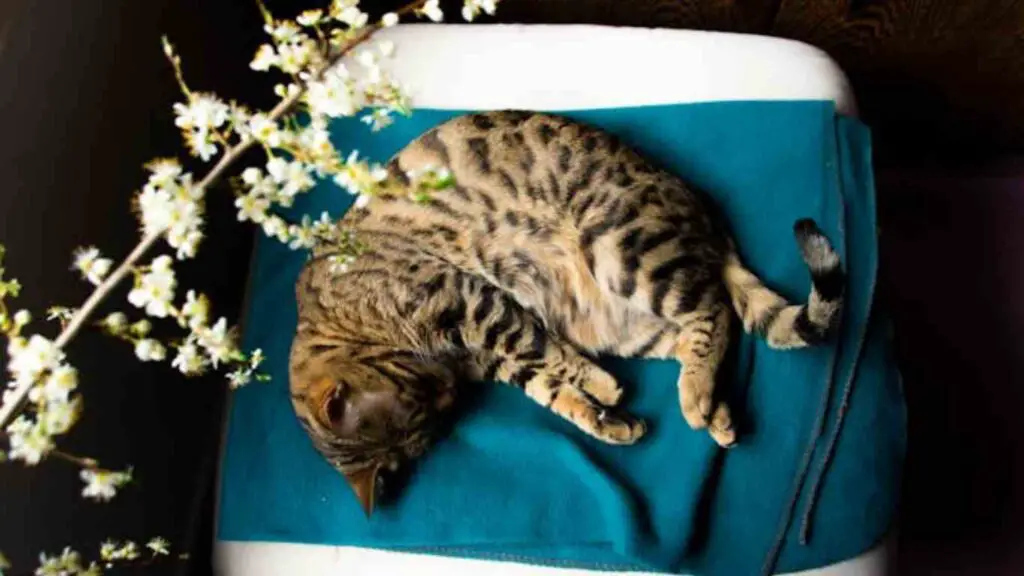
Here are some of my opinions on helping your skinny Bengal cat:
1. Consult Your Veterinarian: Before implementing any changes, it’s essential to consult your veterinarian. They can assess your cat’s overall health and provide personalized advice on the best way to help your Bengal gain weight. Their expertise will ensure you’re on the right track from the start.
2. High-Quality Diet: Ensure your Bengal cat is receiving a high-quality, balanced diet. Look for commercially available cat foods that are specifically formulated for weight gain. These foods are often rich in protein and healthy fats, providing the necessary nutrients for healthy weight gain.
3. Frequent Feedings: Instead of feeding your Bengal cat large meals, try offering smaller, more frequent meals throughout the day. This approach can help increase their calorie intake and stimulate their appetite. Consider feeding your cat three to four times a day, while still maintaining portion control.
4. Nutrient-Dense Treats: Introduce nutrient-dense treats into your Bengal cat’s diet. Look for treats that are high in calories and packed with essential nutrients. These treats can be given in moderation as a supplement to their regular meals.
5. Wet Food: Consider adding wet food to your Bengal cat’s diet. Wet food tends to have a higher calorie content and can be more enticing to cats who may have a decreased appetite. Gradually introduce wet food into their meals and monitor their response.
6. Mealtime Environment: Create a calm and stress-free mealtime environment for your Bengal cat. Cats are sensitive creatures, and any anxiety or disturbances during their meals can deter them from eating. Find a quiet spot in your home where your cat feels safe and comfortable during mealtime.
7. Tempting Food Enhancements: Add tempting food enhancements to your Bengal cat’s meals. Sprinkling a small amount of tuna juice, chicken broth, or grated cheese over their food can make it more appealing. These enhancements can help entice your cat to eat more.
8. Interactive Playtime: Engage your Bengal cat in interactive playtime before meals. Physical activity can stimulate their appetite and increase their interest in food. Use toys that encourage them to chase and pounce, mimicking their natural hunting instincts.
9. Monitor Progress: Keep track of your Bengal cat’s weight gain progress. Regularly weigh your cat and document any changes. If you’re not seeing the desired results or notice any health concerns, consult your veterinarian for further guidance.
Conclusion
In conclusion, if you find yourself wondering why your Bengal cat is so skinny, there could be a few reasons to consider. First, their high energy levels and metabolism might naturally keep them lean. Second, it’s important to ensure they’re getting a balanced diet with enough nutrients. And lastly, consulting with a veterinarian can help rule out any underlying health issues. Remember, keeping your Bengal cat healthy and happy is a top priority!
Find out more about why your Bengal cat is not eating.
Frequently Asked Questions
Let’s look at some frequently asked questions, why Is my Bengal cat so skinny:
Why is my Bengal cat naturally skinny?
Bengal cats are known for their lean and muscular bodies. Their slender appearance is a result of their breed characteristics and genetics. Bengals have a high metabolism, which means they burn calories quickly. Additionally, they are an active and energetic breed that loves to play and explore. This combination of genetics and activity level can contribute to their naturally skinny physique.
Could there be an underlying health issue causing my Bengal cat to be skinny?
While it is normal for Bengal cats to be naturally skinny, there are instances where a cat’s weight loss could be a sign of an underlying health issue. If your Bengal cat is losing weight rapidly or appears to be excessively thin, it is important to consult with a veterinarian. Conditions such as hyperthyroidism, gastrointestinal disorders, or parasites could be causing the weight loss. A thorough examination by a veterinarian can help determine if there is an underlying health issue that needs to be addressed.
What can I do to ensure my Bengal cat maintains a healthy weight?
To ensure that your Bengal cat maintains a healthy weight, it is important to provide them with a balanced diet and plenty of exercise. Feed them a high-quality cat food that is appropriate for their age and activity level. Avoid overfeeding or free-feeding, as this can lead to weight gain. Instead, follow the feeding guidelines provided by the cat food manufacturer and monitor their body condition regularly. Engage your Bengal cat in interactive play sessions and provide them with toys and climbing structures to keep them active and mentally stimulated. Regular veterinary check-ups are also important to monitor their overall health and weight.
Are there any specific dietary considerations for Bengal cats?
While Bengal cats do not have any specific dietary requirements, it is important to provide them with a balanced and nutritious diet. Choose a cat food that is formulated for their specific life stage (kitten, adult, or senior) and meets the nutritional guidelines set by reputable organizations such as the Association of American Feed Control Officials (AAFCO). Additionally, consider feeding your Bengal cat a diet that includes a high percentage of animal-based protein, as this is important for their overall health and muscle development. Always consult with a veterinarian for personalized dietary recommendations for your Bengal cat.
